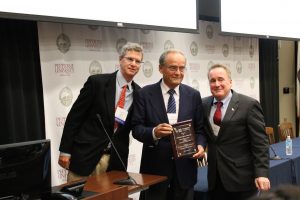We are back in the office after a wonderful (and busy) few days in Malibu, California for the “Doping and the Culture of Sport: Law, Science, Money and Ethics” symposium at Pepperdine University. Convening experts from around the world, this symposium was unique in that it brought together a variety of perspectives on doping — scientists, athletes, journalists, criminal law experts, and doctors.
With these different views, rich discussion ensued about such issues as:
- How far is too far in testing athletes?
- What does it mean to “win the battle” against doping?
- Would implementing lifetime bans from all competing deter athletes from cheating?
- Labs can only report positive tests they can 100% back up with proof, otherwise they face losing funding, etc.
- Eliminating in-sport testing, which can be a conflict of interest;
- The use of gene therapy as a form of cheating, and whether or not evidence can be seen that it is being used;
- The criminalization of doping in sport.
Would you like to see some of the top experts in these fields debate these issues? You can watch the entire symposium here.
You can also view photos from the event in our slideshow:
[fsg_gallery id=”2″]
Honoring Professor Arne Ljungqvist
Professor Arne Ljungqvist, a pioneer in the anti-doping movement, was the keynote speaker for the symposium. He shared his experiences and wisdom from working in the anti-doping field for over 40 years. During the symposium, David Ulich of The Foundation for Global Sports Development announced that Professor Ljungqvist will be the 2014 Humanitarian Award recipient. Mr. Ulich, along with Dr. Steven Ungerleider, presented Professor Ljungqvist with a plaque to honor his commitment to the anti-doping movement.


